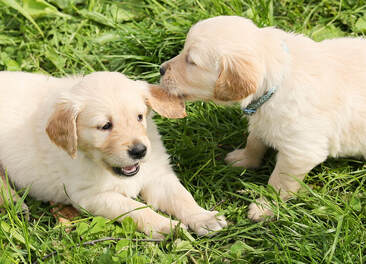|
I think most people now understand how important it is to socialise our puppies. There is lots of information about the critical socialisation period, which finishes somewhere between 14 – 16 weeks of age and therefore we have a very small window of opportunity to get our pups used to the world.
However, this has also caused a rise in ‘puppy parties’. These ‘parties’ tend to be unmanaged and free play is encouraged no matter what sort of interactions are taking place. This is a big concern for me. If you had a shy or timid puppy, then they are very quickly learning that other dogs are actually really scary, and they try to hide or, if that fails, they will learn to defend themselves. If your puppy is a bold, bouncy type, then they are learning to continue this behaviour of being a ‘social bully’ and not listening to other dogs’ body language which is asking them to stop. As an adult dog, we don’t want either of these personality types as we are all aiming to have a well-rounded, confident dog with good social skills. The two parts of socialisation are teaching the social skills for your pup to interact with other living things e.g. people, dogs and other animals, and habituation is about teaching all the things we want them to get used to and usually ignore e.g. noises, traffic, household objects. Hopefully your breeder started your pups socialisation and habituation learning before you even got to take them home, such as gentle handling, introducing to different surfaces, different play items, household noises and sometimes interactions with other suitable adult dogs. All of this habituation and novelty will help build a pup’s confidence and early development. It’s then your turn to continue their education. Puppies are not created equal, even from the same litter. They will need different levels of socialisation and habituation. In the case of puppy socialisation, some will need lots of chances for off lead play with suitable dogs, however another would just learn to be a hooligan if too much free play is allowed. Badly managed interactions can have a negative influence on future behaviour. Being a pet dog is a very hard job as our expectations are so high. We want them to get on with every dog and person they meet, go to every environment and be happy and confident, to cope with being left alone, to not worry with endless ’scary’ noises. Therefore, getting their early upbringing right is a big responsibility. The question I ask myself all the time is “do I want my adult dog behaving like this?” If the answer is no, then think, is this the right thing to be doing with my puppy? Don’t let them practise a behaviour you don’t like! I am not against puppy parties, but they must be managed by skilled professionals. They can be a great resource to get your puppy to learn to interact appropriately with other dogs. I allow off lead play during my puppy classes, however it’s only for a few minutes and I match dogs that are appropriate to interact with each other, and very quickly interrupt any interactions that are not suitable. I am so glad that there is more information available about the importance of puppy socialisation however, as with all knowledge, you need to adapt and grow and continue to question what information is out there. Jo Williams
0 Comments
Leave a Reply. |
Archives
June 2024
|
|
© COPYRIGHT Paws4teaching 2023
Terms and conditions |




